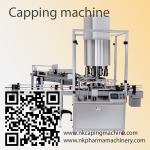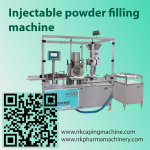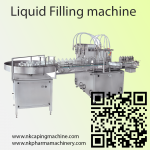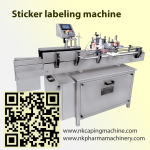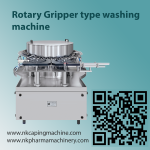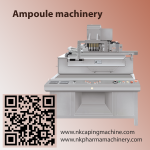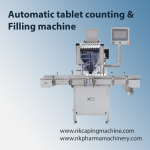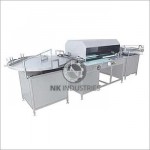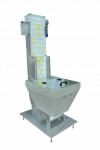Automatic Horizontal Cartoning Machines
N.K. INDUSTRIES: High-Performance Horizontal Cartoning Machines
N.K. Industries is a leading manufacturer and exporter of high-quality packaging machinery, offering robust and versatile horizontal cartoning machines designed to meet the diverse needs of various industries. Our machines are engineered for precision, speed, and durability, ensuring that your production line operates smoothly and efficiently. Whether you are in the pharmaceutical, food and beverage, cosmetic, or chemical industry, our horizontal cartoners provide the perfect solution for your packaging requirements.
What is automatic Horizontal cartoning machine ?
An automatic horizontal cartoning machine, often referred to as a horizontal cartoner, is a sophisticated and automated packaging solution designed to efficiently form, fill, and seal cartons. Its fundamental purpose is to transform flat carton board blanks into fully formed, product-filled, and sealed packages by loading products horizontally through an open end of the carton. This intricate process involves several critical steps: erecting the carton from a folded state, precisely filling it with products, and then securely closing and sealing both ends, often through tucking end flaps or applying adhesives. These machines are engineered to handle a wide variety of products, whether single items, bags, or multiple units, inserting them either through a mechanical sleeve or by pressurized air. As such, automatic horizontal cartoners are recognized as vital equipment within any contemporary warehouse or retail operation, playing a pivotal role in the efficient packaging and subsequent shipping of products across a spectrum of sizes.
The utility of automatic horizontal cartoning machines extends across a remarkably diverse range of industries. They are widely employed in the packaging of foodstuffs, confectionery, medicines, cosmetics, beverages, and a broad array of sundry consumer goods. The integration of these machines into production lines is instrumental for optimizing overall operations, leading to substantial reductions in labor costs and ensuring consistently fast, reliable packaging outputs.
The implementation of automated horizontal cartoning machines yields significant advantages in terms of output, efficiency, and product protection. These machines can achieve impressive speeds, ranging from 25 to over 400 cartons per minute (CPM), drastically surpassing the limitations inherent in manual packaging methods. This high throughput is paramount for companies striving to meet demanding production schedules and scale their operations. Automation inherently eliminates common bottlenecks and the inefficiencies typically associated with slow, manual labor, thereby enhancing overall operational efficiency and facilitating faster changeovers between different product runs.
Beyond mere speed, the precision inherent in automated loading mechanisms minimizes product jostling and potential damage during the packaging process. This ensures consistent, neat packaging that not only elevates brand image but also actively safeguards products against breakage during shipping. Furthermore, automatic horizontal cartoners contribute significantly to product integrity by securing packaging for extended shelf life, preventing tampering, and ensuring reliable packaging accuracy. This is achieved through the sophisticated control provided by servo motors, sensors, and programmable logic controllers (PLCs), which precisely group and place products. The core function of an automatic horizontal cartoning machine thus extends beyond simply enclosing a product; it serves as a critical component in safeguarding product quality and enhancing brand presentation. This directly impacts a company's financial performance and market standing. The machine's ability to seal cartons completely, prevent tampering, and protect against shipping damage moves beyond a basic operational function. These capabilities translate into tangible business advantages for a B2B buyer: reduced product spoilage and waste, fewer customer complaints and returns, adherence to stringent industry regulations (particularly vital in sectors like food and pharmaceuticals), and the cultivation of a stronger, more trustworthy brand image in the marketplace. Consequently, investing in a high-quality automatic horizontal cartoning machine becomes a strategic decision that protects revenue and reputation, rather than merely a production cost.
Type of horizontal cartoning machine ?
The selection of an automatic horizontal cartoning machine type is highly dependent on the specific product, desired speed, and operational constraints. Each type offers distinct advantages.
1. On basis of speed :
-
Semi-Automatic Horizontal Cartoners: While still requiring an operator to manually place products into the cartons, these offer a balance between automation and manual control for specific applications or lower production volumes.
-
Horizontal End-Load Cartoners:
- Functionality: Products are loaded horizontally through an open end of the carton.
- Advantages: Known for achieving high speeds suitable for mass production, often featuring a compact footprint that saves floor space, and offering flexible configurations to handle a wide range of products. They are generally user-friendly in operation and changeover. These are ideal for packaging light bags, pouches, and flexible packages.
- Potential Considerations: Typically best suited for lighter products.
- Intermittent Motion Horizontal Cartoners: These machines operate by starting and stopping for each packaging cycle, offering greater control and precision. They are well-suited for delicate or complex products and typically operate at lower to medium speeds.
-
Continuous Motion Horizontal Cartoners: Designed for smooth, uninterrupted product loading, these machines are ideal for very high-speed, consistent, and high-volume production lines where efficiency is paramount.
-
Robotic Horizontal Cartoning: Represents the pinnacle of flexibility and precision in horizontal cartoning.
- Advantages: Offers exceptionally quick changeovers between product sizes and carton styles, handles custom packaging requirements with ease, provides gentle handling for fragile items, features a compact and modular footprint, ensures high uptime and efficiency, and integrates seamlessly with upstream and downstream equipment. This addresses the need for unparalleled flexibility, gentle handling of delicate or complex items, and highly customized packaging solutions.
Sailent Feature
Featurers of horizontal cartoning machine.
- High-Speed Automation & Throughput: Automatic horizontal cartoners are engineered to achieve impressive speeds, ranging from 25 to over 400 CPM. This capability directly translates into significantly increased production volumes, enabling manufacturers to meet high demand and facilitate Just-in-Time order fulfillment strategies.
- Carton Size Flexibility & Quick Changeovers: A critical feature is the machine's adaptability to a wide range of carton dimensions (length, width, height/depth). The emphasis is on rapid and efficient changeover modules—some advanced servo-driven systems boast changeover times under 5 minutes, as seen with AFA Systems. This flexibility maximizes uptime and allows for efficient handling of diverse product lines and smaller batch sizes. This capability directly responds to the market trend of diverse product lines and smaller batch sizes, where minimizing downtime between runs is critical for profitability.
- Versatile Product Handling: Automatic horizontal cartoners are designed to handle an extensive array of product types, particularly light bags, pouches, and flexible packages, but also rigid items. This versatility is achieved through specialized feeding systems, including flat grouping, bucket grouping, orienting systems, custom feeding solutions, and barrel loaders. Products are typically loaded horizontally through an open end.
- Advanced Quality Control Systems:
- The "No product-No leaflet-No carton" system is a sophisticated mechanism that ensures error-free output by preventing the machine from operating if any component is missing, thereby significantly reducing material waste.
- Integrated "Open flap detect & reject" systems are crucial for preventing improperly sealed or faulty packages from entering the supply chain, safeguarding product integrity and brand reputation.
- The integration of advanced vision systems and AI-equipped visual inspection provides unparalleled precision in product placement and defect detection. These intelligent systems increase accuracy, reduce false positives, and ensure consistent quality. Such systems address the growing complexity of quality control, especially for high-value or regulated products (e.g., pharmaceuticals), by offering precision and speed beyond human capability.
- Robust Machine Design & Longevity: The construction of these machines emphasizes durability and long-term reliability. Features include heavy-duty parts, metal frames designed to reduce vibration , stainless steel construction for hygiene and corrosion resistance , and cGMP-compliant balcony designs. These design choices contribute to extended machine lifespan, reduced maintenance needs, and consistent performance.
- User-Friendly Interface & Controls: Modern automatic horizontal cartoners are equipped with intuitive touch screen control panels and integrated controls, such as Allen Bradley PLCs. These interfaces simplify operation, streamline setup procedures, and provide comprehensive onboard diagnostics, enhancing ease of use for operators.
- Seamless Integration Capabilities: A key advantage is the ability of automatic horizontal cartoning machines to integrate seamlessly with both upstream equipment (such as blister packaging machines, bottle unscramblers, or flow wrappers) and downstream equipment (including case packers and palletizers). This enables the creation of fully automated, end-to-end packaging lines, optimizing overall workflow.
- Sustainability Features: Reflecting a growing industry trend, some advanced cartoners support the use of paper-based packaging and other sustainable materials. This aligns with corporate environmental goals and consumer demand for eco-friendly solutions. This capability is driven by increasing consumer awareness and regulatory pressures, allowing companies to align with eco-friendly practices and reduce their environmental footprint.
- IoT/Industry 4.0 Readiness: Cutting-edge machines incorporate Internet of Things (IoT) capabilities, such as remote asset visibility and real-time monitoring. These features enable predictive maintenance, optimize machine performance, and facilitate remote troubleshooting, minimizing downtime and maximizing operational efficiency. This addresses the demand for predictive maintenance, remote diagnostics, and data-driven optimization, crucial for maximizing uptime and reducing unforeseen operational disruptions.
Technical Specification
|
Specification |
Semi-Automatic catoning |
Intermittent Motion cartoning |
Continuous Motion cartoning |
|
Speed / Output |
10 - 40 cartons/min |
20 - 80 cartons/min |
80 - 400+ cartons/min |
|
Machine Dimensions (L x W x H) |
Approx. 1500 x 800 x 1200 mm |
Approx. 3000 x 1500 x 1800 mm |
Approx. 4000 x 1800 x 2000 mm and larger |
|
Power Consumption |
0.5 - 1.5 kW |
1.5 - 3 kW |
3 - 7.5 kW and higher |
|
Compressed Air Requirement |
6 - 8 bar |
6 - 8 bar |
6 - 8 bar |
|
Mode of Operation |
Manual product feeding, automatic carton erection and closing |
Automatic carton erection, product feeding, and closing in a start-stop sequence |
Automatic carton erection, product feeding, and closing in a continuous flow |
|
Typical Applications |
Small batches, startups, and operations requiring flexibility |
Medium-speed production lines for pharmaceuticals, cosmetics, and food |
High-speed, high-volume production lines for various industries |
|
Changeover Time |
Quick and simple, requires manual adjustments |
Moderate, may involve some tool-based adjustments |
Longer, often requires skilled technicians and can be more complex |
|
Machine Weight |
200 - 500 kg |
800 - 1500 kg |
1500 - 3000+ kg |
|
Material of Construction |
Often Mild Steel with Stainless Steel contact parts |
Primarily Stainless Steel (SS304 / SS316) for cGMP compliance |
Primarily Stainless Steel (SS304 / SS316) for cGMP compliance |




